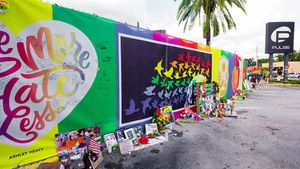I never had HBO, and I surely wasn't supposed to be watching anything on it. Luckily, one of my besties did, and her mom was a fan of Sex and the City, and if only for a few moments, I would catch glimpses of the magic of that show when I was hanging out over there. That friend was beyond patient in waiting for me to come out.
She was also patient when I asked if I could watch The Comeback every week for thirteen weeks. If my eyes were glued to the screen, then, as an indication of my tell, she knew of my growing love for Valerie Cherish.
Of course, Phoebe was my absolute favorite friend! But please, without getting pummeled by the impressive fan base for the timeless juggernaut, I will say that some of those homophobic jokes gracing the screen while I timidly sat next to my parents were uncomfortable.
Thus, it was not throughout ten seasons of Friends but rather the skim 92 minutes of Romy and Michele's High School Reunion that Lisa Kudrow became a safe space for me. Diving into her filmography continued, and then, on a hot, perfect June day in 2005, Valerie Cherish was born.
I've written about how Final Girls and Scream Queens can symbolize survival and comfort within the realm of closeted and trauma-filled childhoods. I find myself realizing here that Valerie's slow-burn plight against her nemesis, Paulie G, held the same power for me. In the penultimate episode, after we finally discover the deep wounds of Valerie's painful past as a loner with scoliosis, watching her take Paulie down was just as thrilling as watching Laurie Strode beat the shit out of Michael Myers.
Just like the horror genre, we waited and waited and waited for a sequel, nine years to be exact, but this time, she had come back to haunt him whether he liked it or not. Because this time, slowly but surely, Val was calling the shots.
Paulie, played effortlessly by Lance Barber, didn't wear a mask like those scary icons, but Valerie did. She was constantly wearing a mask, just like myself and other queer fans who could see beyond her selfishness and see her desperate need to fit in, to be liked, to make it. Twenty years on, we are still fighting for our place in the world, but Valerie getting what she wanted was ammo to keep going.
Another reason Valerie resonated with me is that I dream of making my mark in show business as an actor and writer. Quickly, the story of Val's Comeback went from my mere daydreams to my reality when I relocated to Los Angeles from Maryland. I suffered my first big, hopeful Hollywood career blow around the same time season two had finished its run. I distinctly remember lying in bed one afternoon, numb with depression. I'm glad Val was fresh in my head because my mind was able to conjure up an image of Val's iconic, ridiculous, and most importantly, powerful rendition of "I Will Survive." I was out the door and on a run to nowhere, but at least I was moving.
In the words of Valerie: "You have to learn to roll with it my friends, that's how you survive."
Although it eventually made a triumphant return in 2014, The Comeback ended after one season; the world just wasn't ready yet for its revolutionary storytelling. But thank god, the gays were! We kept it alive. The show was infused with queer culture, from the co-creative mastermind Michael Patrick King, among many others behind the scenes, to several characters and cameos, including Valerie's ultimate gay best friend, Mickey Dean (played by the late great Robert Michael Morris).
No one can replace him, but if Val returns, she'll "gotta get a gay."
One way I maintained my drive for creative survival was through my fandom of The Comeback, which led to an epiphany about how many TV shows had their podcasts. I never stop talking about The Comeback, so I might as well create a podcast for the underrated gay icon myself. My podcast, I Don't Want to Hear That!, was inspired by Valerie's iconic phrase, "I don't want/need to see that!" that was out in the world. I even wrote a spec script for a potential new season, which I'll call fanfic because I couldn't get her out of my head after I finished covering season one.
I've been blessed to have many guests from the show, even meeting the kind and appreciative Lance Barber, who is nothing like the villain he plays! I've interviewed many incredible LGBTQ+ personalities and met numerous fans of a similar ilk while running the podcast and Instagram page. And, of course, we shout out to the straight fans of this show who have taste! Lisa herself was once quoted as saying that gay men are superior beings. Obviously, by "getting the nuances more," we stood by The Comeback and still do.
Ultimately, Valerie found a sense of truth and freedom within herself. That's all we, as a community, want to achieve, especially for the generations that come after us. I've always aspired to hold onto my pluck just like Valerie, and I'm still here trying, and my story isn't over.
In our hearts, Valerie isn't over, either. Will she rise again to fight the good fight? We'll see. But what a gift these twenty years have been. We can't ask for better than that.
Perspectives is dedicated to featuring a wide range of inspiring personal stories and impactful opinions from the LGBTQ+ and Allied community. Visit pride.com/submit to learn more about submission guidelines. We welcome your thoughts and feedback on any of our stories. Email us at [email protected]. Views expressed in Perspectives stories are those of the guest writers, columnists and editors, and do not directly represent the views of PRIDE.com or our parent company, equalpride.





















































































